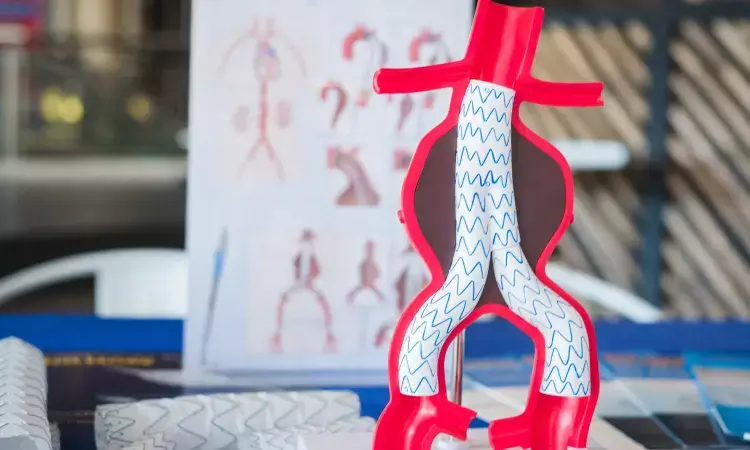- Home
- Medical news & Guidelines
- Anesthesiology
- Cardiology and CTVS
- Critical Care
- Dentistry
- Dermatology
- Diabetes and Endocrinology
- ENT
- Gastroenterology
- Medicine
- Nephrology
- Neurology
- Obstretics-Gynaecology
- Oncology
- Ophthalmology
- Orthopaedics
- Pediatrics-Neonatology
- Psychiatry
- Pulmonology
- Radiology
- Surgery
- Urology
- Laboratory Medicine
- Diet
- Nursing
- Paramedical
- Physiotherapy
- Health news
- Fact Check
- Bone Health Fact Check
- Brain Health Fact Check
- Cancer Related Fact Check
- Child Care Fact Check
- Dental and oral health fact check
- Diabetes and metabolic health fact check
- Diet and Nutrition Fact Check
- Eye and ENT Care Fact Check
- Fitness fact check
- Gut health fact check
- Heart health fact check
- Kidney health fact check
- Medical education fact check
- Men's health fact check
- Respiratory fact check
- Skin and hair care fact check
- Vaccine and Immunization fact check
- Women's health fact check
- AYUSH
- State News
- Andaman and Nicobar Islands
- Andhra Pradesh
- Arunachal Pradesh
- Assam
- Bihar
- Chandigarh
- Chattisgarh
- Dadra and Nagar Haveli
- Daman and Diu
- Delhi
- Goa
- Gujarat
- Haryana
- Himachal Pradesh
- Jammu & Kashmir
- Jharkhand
- Karnataka
- Kerala
- Ladakh
- Lakshadweep
- Madhya Pradesh
- Maharashtra
- Manipur
- Meghalaya
- Mizoram
- Nagaland
- Odisha
- Puducherry
- Punjab
- Rajasthan
- Sikkim
- Tamil Nadu
- Telangana
- Tripura
- Uttar Pradesh
- Uttrakhand
- West Bengal
- Medical Education
- Industry
Females at higher risk of kidney damage after endovascular repair of abdominal aneurysm, predicts algorithm

Female patients have a higher risk for kidney damage after endovascular repair when receiving treatment for abdominal aortic aneurysm according to a Michigan Medicine study.
Researchers from Michigan Medicine designed an algorithm that can be used prior to endovascular abdominal aortic aneurysm repair to identify risk for kidney damage. They tested the algorithm using data from over 7,000 patients through the Blue Cross Blue Shield of Michigan Cardiovascular Consortium database.
The risk prediction algorithm, according to findings published in Annals of Vascular Surgery, demonstrated that women receiving endovascular aneurysm repair had 1.4 times higher odds of developing acute kidney injury after aneurysm repair.
“While we have seen higher risk of acute kidney injury in female patients who have undergone coronary stenting or renal stenting, this is the first time we are seeing a higher risk after endovascular abdominal aortic aneurysm repair,” said senior author Peter Henke, M.D., FACS, FAHA, vascular surgeon and director of the University of Michigan Health Frankel Cardiovascular Center.
Patients with reduced glomerular filtration rate, an indicator of kidney disease, had 4.7 times higher odds of developing acute kidney injury after aneurysm repair. Those with larger aneurysms were also at increased risk. These findings are less surprising than the higher odds of kidney injury in women, investigators say, given patients’ decreased renal function at baseline and the possible prolonged procedures and intra-operative contrast loads that come with larger aneurysms.
Abdominal aortic aneurysm is the most common form of aneurysm, affecting around 5% of the global population. The Michigan Medicine research team hopes to implement the algorithm in clinical practice to provide at-risk patients with optimization before an operation.
“Kidney injury after surgery can be benign, but for some patients it leads to permanent renal failure and, in some instances, dialysis,” said Drew Braet, M.D., first author and vascular surgery resident at U-M Health. “This algorithm shows that we can use easily attainable factors prior to surgery that may help identify patients at risk of complications during their surgery and, thus, ensure we are optimizing these patients accordingly. If we can protect patients and decrease their risk of permanent renal failure, then we have truly provided them a benefit.”
Reference:
Drew J. Braet, Nathan J. Graham, Jeremy Albright, Nicholas H. Osborne, Peter K. Henke, Published:February 28, 2023 DOI:https://doi.org/10.1016/j.avsg.2023.02.017.
Dr Kamal Kant Kohli-MBBS, DTCD- a chest specialist with more than 30 years of practice and a flair for writing clinical articles, Dr Kamal Kant Kohli joined Medical Dialogues as a Chief Editor of Medical News. Besides writing articles, as an editor, he proofreads and verifies all the medical content published on Medical Dialogues including those coming from journals, studies,medical conferences,guidelines etc. Email: drkohli@medicaldialogues.in. Contact no. 011-43720751


